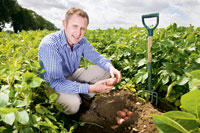2010 FW Awards: Arable Farmer of the Year – Chris Baylis

Turning around the fortunes of a struggling arable business single-handed is no mean feat. But that is exactly what Chris Baylis has achieved.
Back in 2004 when he joined the farm as manager, the business made a loss of £130/ha “and it was up against it”. To tackle this, he looked at cutting costs, as well as increasing crop yields.
He started with the rotation. It was a complicated farm with potatoes and sugar beet in an “awful” one-in-four-year rotation.
“Soil structure was suffering, there was insufficient organic matter and it was affecting yields. Weed beet volunteers were also a problem.”
The owners wanted to continue growing potatoes, so they decided to reduce the area grown. Coupled with a smaller sugar beet area, Chris was able to widen the rotation to a more sustainable one in six years.
On lighter land, wheat is followed by potatoes, then wheat, sugar beet, wheat and vining peas. On heavy land, oilseed rape is the break crop of choice.
Since implementing the rotation, sugar beet yields have increased from 40t/ha to an average of 63t/ha last year. Wheat topped 9.6t/ha, oilseed rape 4.5t/ha and potatoes 20t/ha. “We are effectively producing the same tonnage of beet on a smaller area,” he says.
To improve soil structure, he introduced organic matter by means of a straw-for-muck agreement with a local cattle farmer, being applied after oilseed rape to minimise compaction. Sewage sludge is also used and remaining straw is incorporated.
Chris is keen to try new varieties – this year it is Duxford. With oilseed rape, a third of the area is down to hybrid varieties (Excalibur), which he views as a management tool.
“We grow hybrids in fields with a known pigeon problem near houses where we cannot use gas guns. They have more vigour coming out of winter, so quickly overcome any pigeon damage.”
He has adopted a range of cultivation techniques to match the varying soil types. On lighter land, oilseed rape is established with a Vaderstad TopDown 500 followed by a drill. He is looking into adopting variable seed rates, to help even out in-field variation.
Another problem when he started at Revesby was that the costs were unknown. “We didn’t know exactly how much each machine cost to operate or the cost of producing each crop.”
So Chris introduced a system with every piece of kit having its own cost code, allowing him to make changes.
The potato enterprise was in need of investment in new equipment and it only had 1600t of storage, with most of the crop being sold off-farm as they were lifted. “This meant we were pushed down the processing route, which was not viable.”
He established a joint venture with the Co-op, where the business is paid to contract grow the crop. “We still plant and spray the crop, but we now use contractors for the lifting.
“We’ve now had four successful crops of good-quality potatoes. It has transformed cash flow and freed up working capital.
Another change was to streamline machinery and staff. Staffing has been halved to four full-time employees.
There was never a machinery policy and the farm had nine tractors requiring lots of maintenance. “Our policy is to replace big kit items (combine, sprayer and tractor) once every six years from new.”
The tractor fleet includes a Cat Challenger 765c, Claas 630 and 826. At peak times, he hires two additional tractors – one 155hp for grain carting and a 300hp unit for cultivations.
He does all his own marketing and avoids using pools. “I like to know the price on the day,” he says.
A proportion is sold forward, around a third of this year’s wheat crop is already committed, with the rest sold at regular intervals to local merchants for export via the nearby ports of Boston and Immingham. He is also growing Scout to sell to a local dog biscuit factory.
He values his staff, and offers benefits such as BUPA healthcare and stakeholder pensions and training.
The result of the changes is that the farm is now profitable and sustainable. However, he stresses that it has been a team effort.
WHAT THE JUDGES LIKED
• Good awareness of costs
• Established sustainable potato enterprise
• Increased crop yields
FARM FACTS
• Manages 1222ha
• Home farm plus three estate farms on FBT
• Winter wheat, oilseed rape, spring malting barley, potatoes, sugar beet and vining peas
• Four full-time staff
• Soils: Clay loam, sandy clay loam plus sandy loam

